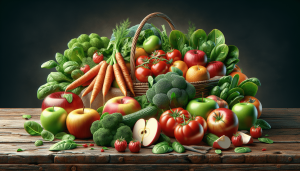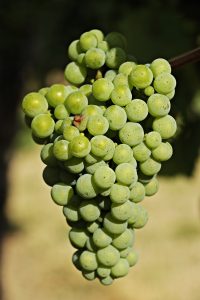Organic products and non-organic ones are like two distinct worlds, each with their own unique qualities. When it comes to understanding the differences, it’s not simply a matter of choosing one over the other, but rather recognizing the contrasting approaches to farming, processing, and labeling. Organic products, cultivated without synthetic fertilizers or pesticides, prioritize environmentally friendly practices and promote sustainable agriculture. On the other hand, non-organic products may involve the use of synthetic chemicals and genetically modified organisms (GMOs), while also taking advantage of conventional farming techniques. In this article, we will explore the diverse characteristics that set these two types of products apart, shedding light on what truly makes organic products special.

Production Methods
Use of Chemicals
At the heart of organic production methods is the commitment to minimize the use of chemicals. Unlike conventional farming, where synthetic pesticides and fertilizers are commonly used, organic farmers rely on natural alternatives. This approach helps to reduce the environmental impact of agriculture and minimize the potential health risks associated with chemical exposure. By employing organic production methods, we prioritize the long-term health of the ecosystem while still maintaining high standards of productivity.
Genetic Modification
Organic production methods also steer clear of genetically modified organisms (GMOs). While genetic modification has its own merits and is widely used in conventional farming to enhance crop characteristics, organic farmers adhere to traditional breeding methods to maintain the natural integrity of their products. By doing so, we prioritize the preservation of genetic diversity and respect the consumers’ preferences for non-GMO foods.
Crop Rotation
Crop rotation is a fundamental practice in organic farming that promotes soil health and prevents the buildup of pathogens and pests. By rotating crops, we can naturally control weeds and manage soil fertility without relying on chemical inputs. This method also helps to break pest and disease cycles, reducing the need for synthetic pesticides. Through the careful planning of crop rotation, we are able to ensure sustainable and resilient farming systems.
Pesticides and Fertilizers
Amount and Type of Pesticides
One of the primary differences between organic and non-organic products lies in the amount and type of pesticides used. In organic farming, the use of synthetic pesticides is strictly prohibited. Instead, farmers employ a range of natural pest control mechanisms, such as beneficial insects, crop diversification, and physical barriers. This approach reduces the risk of pesticide residue contamination on crops and helps to protect the health of consumers and the environment.
Organic Approaches to Pest Control
Organic farmers adopt a holistic approach to pest control by embracing natural methods and symbiotic relationships in the ecosystem. They focus on enhancing the resilience of plants through proper soil management, crop rotation, and the use of natural pest deterrents. By fostering a balanced environment where pests are controlled by their natural predators, organic farmers create healthier crops without reliance on chemical interventions.
Fertilizer Usage
Organic farming places great importance on maintaining soil fertility through sustainable and organic means. Instead of synthetic fertilizers, organic agriculture relies on the use of natural fertilizers, such as compost, animal manure, and cover crops. These organic fertilizers are rich in essential nutrients and promote long-term soil health. By utilizing these natural sources of nutrients, organic farmers minimize the risk of nutrient runoff, protect water quality, and contribute to the overall sustainability of their farming practices.

Soil Management
Soil Fertility
Maintaining soil fertility is a cornerstone of organic farming. Organic farmers prioritize the health of the soil by employing practices that enhance its organic matter content, microbial activity, and nutrient availability. By using cover crops, compost, and crop rotation, organic farmers aim to build and maintain fertile soils naturally. This not only supports vigorous plant growth but also improves water absorption and reduces the risk of erosion.
Erosion Control
Preventing soil erosion is a critical aspect of organic farming. Through the use of cover crops, reduced tillage, and contour farming, organic farmers protect against soil erosion caused by wind and water. These practices help to retain moisture in the soil, improve nutrient retention, and maintain the overall structure of the land. By implementing erosion control techniques, organic farmers reduce the negative environmental impact that erosion can have on nearby waterways.
Enhancing Soil Structure
Organic farmers prioritize enhancing soil structure to ensure optimal growing conditions for crops. By avoiding heavy machinery and minimizing soil compaction, organic farming helps maintain a well-aerated soil that allows for healthy root development and nutrient uptake. Additionally, organic farmers focus on building soil organic matter, which improves aggregate stability, water holding capacity, and overall soil structure. This holistic approach to soil management ensures the long-term sustainability of organic farming systems.
Food Safety
Traceability
Organic products provide a high level of traceability, offering consumers peace of mind about the origin and production methods of their food. Stringent record-keeping requirements are imposed on organic farmers, allowing for traceability from farm to table. This transparency allows consumers to make informed choices and connect with the farmers who produce their food.
Purity Standards
To meet organic certification standards, organic products must adhere to strict purity standards. This means they need to be free from synthetic pesticides, GMOs, sewage sludge, and irradiation. By ensuring that organic products meet these purity standards, consumers can have confidence that their food has been produced in a manner that aligns with environmental sustainability and consumer health.
Food Additives
In contrast to non-organic products, organic foods prohibit the use of certain food additives. Organic standards restrict the use of artificial colors, flavors, and preservatives, as well as a range of other synthetic additives. By limiting the use of these additives, organic products offer a more natural and wholesome option for consumers who prefer to minimize their intake of artificial ingredients.

Environmental Impact
Water and Air Quality
Organic farming practices prioritize the protection of water and air quality. By minimizing the use of synthetic pesticides and fertilizers, organic farmers help prevent the contamination of water sources and reduce the risk of air pollution. Additionally, organic practices such as crop rotation, cover cropping, and conservation tillage help to improve water infiltration, reduce soil erosion, and protect water quality. This commitment to environmental stewardship ensures that organic farming has a lower impact on the surrounding ecosystems.
Biodiversity Preservation
Organic farming plays a crucial role in preserving biodiversity. By avoiding the use of synthetic pesticides and genetically modified crops, organic agriculture supports a more diverse range of flora and fauna. The preservation of biodiversity is essential for maintaining a balanced ecosystem, as it ensures the continued viability of pollinators, natural pest control agents, and beneficial soil organisms. By choosing organic products, consumers contribute to the protection of biodiversity and the overall health of our planet.
Energy Consumption
Organic farming practices often require less energy than conventional methods. With a focus on natural soil fertility, crop rotation, and other organic management techniques, organic farmers reduce their dependence on energy-intensive inputs such as synthetic fertilizers and pesticides. By prioritizing energy efficiency and sustainable practices, organic farming helps conserve resources and reduce greenhouse gas emissions, contributing positively to the fight against climate change.
Animal Welfare
Hormone and Antibiotic Use
Animal welfare is a significant concern in organic farming. Organic standards prohibit the routine use of growth hormones and antibiotics in livestock production. This restriction ensures that animals are not subjected to unnecessary treatments and are raised in a manner that aligns with their natural behavior and well-being. By choosing organic animal products, consumers actively support the welfare of farm animals.
Livestock Living Conditions
Organic farming standards also emphasize providing animals with humane living conditions. Organic livestock are given access to outdoor areas to graze and exercise, instead of being confined to cramped spaces. By allowing animals the freedom to engage in their natural behaviors, such as rooting or pecking, organic farming respects the intrinsic needs of animals and promotes their overall welfare.
Organic Animal Feed
The organic certification standards for animal products extend beyond the animals themselves to their feed. Organic livestock must be fed with organic feed that is free from synthetic pesticides and GMOs. This requirement ensures that the animals’ diet aligns with organic principles, further contributing to the overall integrity of organic animal products. By consuming organic animal products, consumers can have confidence in supporting a more humane and sustainable agricultural system.

Health Benefits
Nutrient Content
Organic products are often praised for their potential health benefits. While research is ongoing, studies suggest that organic crops may have a higher nutrient content compared to non-organic counterparts. Some studies have shown that organic fruits and vegetables tend to contain higher levels of certain antioxidants and vitamins. While the specific health benefits may vary depending on the crop and growing conditions, consuming organic foods can be a valuable way to incorporate a range of essential nutrients into our diet.
Reduced Exposure to Toxins
By avoiding the use of synthetic pesticides and chemical additives, organic products offer consumers a reduced risk of exposure to potentially harmful substances. Studies have shown that residues of synthetic pesticides can be detected on conventionally grown crops and animal products, and the long-term effects of these residues on human health are still being researched. Organic products provide an alternative for consumers looking to minimize their exposure to these chemicals and make choices that align with their health priorities.
Allergenicity
For individuals with allergies or sensitivities, organic products can offer a safer alternative. By excluding certain additives and synthetic substances, organic foods reduce the risk of triggering allergic reactions in susceptible individuals. While allergies vary from person to person, many individuals report experiencing fewer adverse reactions when consuming organic foods. This increased peace of mind can be particularly valuable for those with severe allergies or dietary restrictions.
Labeling and Certification
USDA Organic Label
To ensure transparency and consistency, the United States Department of Agriculture (USDA) has established the organic labeling program. Products bearing the USDA Organic label meet strict organic standards and are verified by a third-party certifier. This label provides assurance to consumers that the product has undergone rigorous testing and certification processes, giving them confidence in the organic claims made by the producer.
Other Certification Systems
The USDA Organic label is not the only organic certification system in existence. Various private organizations provide their own certifications, each with their own set of standards. These certifications may have additional requirements beyond the USDA Organic program, offering consumers more specific choices that align with their values or dietary preferences. By looking for these additional certifications, consumers can further tailor their organic choices to meet their individual priorities.
Third-party Verification
To maintain the integrity of organic agriculture, third-party verifiers play a crucial role. These independent organizations assess and verify organic practices, ensuring that farmers and producers adhere to organic standards. By conducting on-site inspections and audits, third-party verifiers provide consumers with added trust in the organic claims made by producers. This system of verification helps to maintain the credibility and transparency of the organic industry.

Price
Cost Considerations
One significant aspect that often comes into consideration when comparing organic and non-organic products is cost. Organic products tend to have a higher price point due to the labor-intensive and more regulated nature of organic production. Organic farmers often face higher costs associated with organic inputs, organic certification, and alternative pest control methods. However, it’s essential to consider the potential long-term benefits to personal and environmental health when evaluating the worth of organic products.
Supply and Demand Factors
The supply and demand dynamics also influence the pricing of organic products. As consumer demand for organic products continues to grow, more farmers are transitioning to organic farming practices. However, the transition process takes time, and supply may not always match demand, leading to higher prices for organic products. As the organic market continues to evolve and mature, it is expected that economies of scale and increased supply will help make organic products more affordable.
Economic Implications
Supporting organic agriculture can have positive economic implications both at a local and global scale. By purchasing organic products, consumers contribute to the growth of the organic sector, creating employment opportunities within the industry. Additionally, organic farming practices often promote sustainable land use, which can help preserve farmland and agricultural ecosystems for future generations. The economic benefits of organic agriculture extend not only to the farmers but also to the broader community and environment.
Consumer Preferences
Motivations for Choosing Organic
Consumers choose organic products for various reasons. Some prioritize environmental sustainability and prefer to support farming practices that minimize harm to ecosystems. Others opt for organic products due to concerns about chemical exposure and food safety. Animal welfare, health benefits, and taste perceptions are also factors that influence consumer preferences for organic products. By understanding these motivations, producers can better tailor their offerings to meet the diverse needs and desires of organic consumers.
Perceived Quality
Organic products are often associated with higher quality due to the rigorous standards and careful production methods employed. Many consumers believe that organic foods taste better, are fresher, and have a more authentic flavor compared to non-organic alternatives. While individual preferences may vary, the perceived quality of organic products is a significant factor that drives consumers to choose organic over non-organic.
Market Growth
The organic market has experienced significant growth in recent years, reflecting the increasing consumer interest in organic products. As more individuals become aware of the potential benefits of organic agriculture, demand continues to rise. This growth is not only limited to fruits and vegetables but also extends to organic dairy, meat, and processed products. The expanding market presents opportunities for producers to meet this growing demand while maintaining the integrity and values of organic farming.
In conclusion, the production methods, pesticide usage, soil management, food safety measures, environmental impact, animal welfare, health benefits, labeling and certification, price considerations, and consumer preferences all differentiate organic products from non-organic ones. By embracing organic agriculture, we strive to create a more sustainable and ethical food system that prioritizes the health of consumers, the well-being of animals, and the preservation of our environment. With the increasing availability and awareness of organic products, consumers have the opportunity to make conscious choices that align with their values and contribute to a healthier planet for all.




